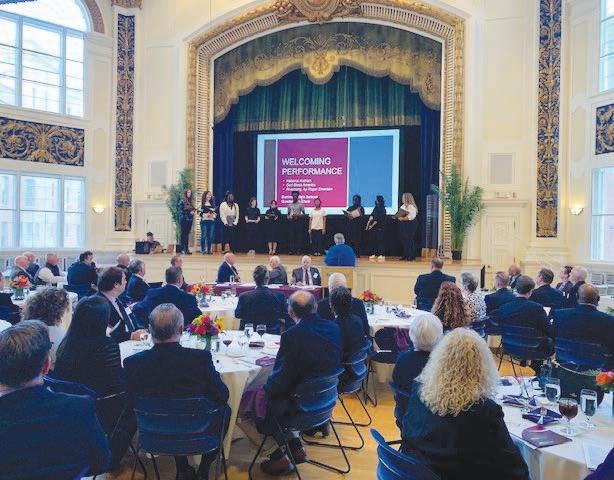
2 minute read
Rep. Soter supports House budget 2024
State representative Michael Soter (r-Bellingham) recently supported a $56 billion-plus state budget for Fiscal Year 2024, which provides for increased local aid, free universal school meals, childcare provider assistance, and eviction protections for renters.
The preliminary House budget was approved on a vote of 156-0 on April 26, following three days of debate on 1,566 amendments that were filed by members. During floor debate, representative Soter successfully advocated for the inclusion of several local initiatives for his district, including:
Advertisement
• $15,000 – Bellingham Public Library Electronic Sign
• $15,000 – Blackstone Town Hall Public Safety Upgrades
• $15,000 – Millville Fire Hydrant repair/replacement
• $15,000 – Uxbridge Youth Soccer League Field Design
• $20,000 – Uxbridge Youth Sport and Public Park infrastructure Projects representative Soter said that the proposed House budget funds Chapter 70 education aid at $6.58 billion, an increase of $595.8 million, which fully funds 3/6ths of the goal rate mandated under the 2019 Student Opportunity Act, while also providing an additional $7.86 million in minimum aid supplemental funding to boost per pupil minimum aid from $30 to $60. Unrestricted general government Aid (UggA), which can be used by communities to support a wide range of municipal services, is funded at $1.25 billion, an increase of $19.7 million. According to representative Soter, the House spending proposal will provide the 8th Worcester District with $33,018,785 in direct education aid and $7,142,648 in unrestricted state aid for the new fiscal year that begins July 1. representative Soter noted the House budget funds charter school aid, regional school transportation and homeless student transportation at 100% reimbursement rates by providing $232.7 million in charter school reimbursements for sending districts, along with $107.86 million in regional school transportation (an increase of $25.68 million), and $28.67 million for homeless student transportation ($5.69 million more than this year). The House budget also includes $506 million in Special Education Circuit Breaker reimbursements, an increase of $55 million over the current year, and provides for $10 million in rural School Assistance grants. representative Soter noted the budget also establishes a commission to study school meal nutrition and requires the Department of Elementary and Secondary Education (DESE) to study and make recommendations for minimizing school food waste.
• $25,000 – Medway Community Farm, inc.

Under the proposed House budget, the state would spend $1 billion in anticipated revenues from the voterapproved Millionaires Tax by investing this funding equally in education and transportation initiatives. The largest share of education-related funding ($161 million) would go towards making free universal school meals permanent, while half of the transportationrelated funding ($250,000) would be dedicated to capital investments for the MBTA. More than 80,000 students a day have eaten lunch in schools since the universal school meals program started, saving households up to $1,200 per child per year.
Provisions included in the House budget require that 85% of any Millionaires
Tax revenues collected in excess of $1 billion be deposited in an Education and Transportation innovation Fund that would be available for use in any subsequent spending bill for one-time spending purposes. The remaining 15% of excess revenues would be deposited in an Education and Transportation Stabilization Fund, which could be drawn down as needed. The balance of this fund would be capped at 33% of the surtax spent in the previous fiscal year.
During floor debate, representative Soter supported an amendment filed by republican Leadership to strike language from the budget that would exempt Millionaires Tax revenues deposited into the Education and Transportation Stabilization Fund from counting towards the allowable state tax revenue limitations under Chapter 62F and 62F calculations. Chapter 62F was approved by the state’s voters in 1986 and requires that excess tax revenues be returned to the state’s taxpayers whenever revenue collections in a fiscal year exceed an annual cap tied to wage and salary growth.
The amendment failed on a party-line vote of 25-132. representative Soter said the proposed exclusion is not justified, as all other taxes including taxes constitutionally designated towards specific uses like the gas tax are included in the current calculation, and tax rate increases have not been held aside from the formula previously. He argued the Legislature should not be making these changes unilaterally, as they only serve to undermine the will of the voters.










